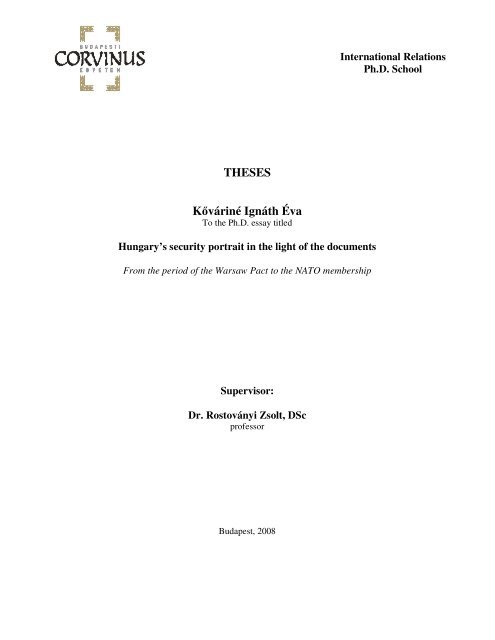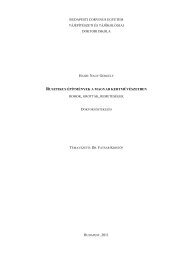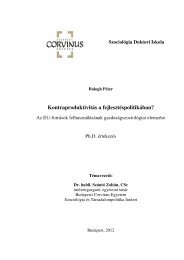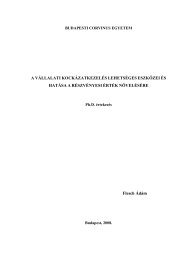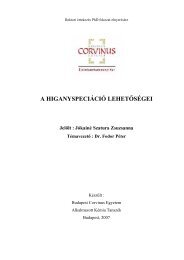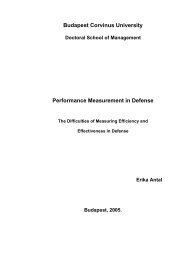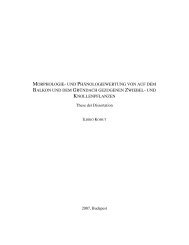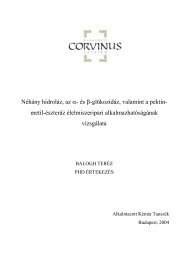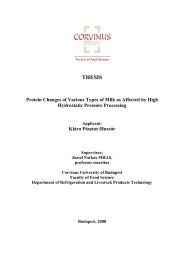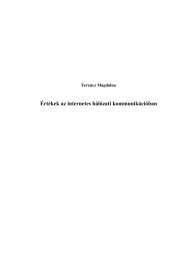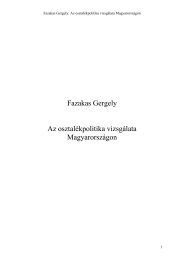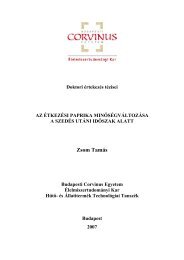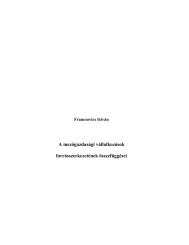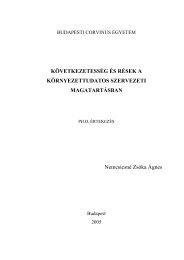THESES Kőváriné Ignáth Éva
THESES Kőváriné Ignáth Éva
THESES Kőváriné Ignáth Éva
Create successful ePaper yourself
Turn your PDF publications into a flip-book with our unique Google optimized e-Paper software.
<strong>THESES</strong><br />
<strong>Kőváriné</strong> <strong>Ignáth</strong> <strong>Éva</strong><br />
To the Ph.D. essay titled<br />
Hungary’s security portrait in the light of the documents<br />
From the period of the Warsaw Pact to the NATO membership<br />
Supervisor:<br />
Dr. Rostoványi Zsolt, DSc<br />
professor<br />
Budapest, 2008<br />
International Relations<br />
Ph.D. School
2<br />
INSTITUTE FOR INTERNATIONAL STUDIES<br />
<strong>THESES</strong><br />
<strong>Kőváriné</strong> <strong>Ignáth</strong> <strong>Éva</strong><br />
To the Ph.D. essay titled<br />
Hungary’s security portrait in the light of the documents<br />
From the period of the Warsaw Pact to the NATO membership<br />
Supervisor:<br />
Dr. Rostoványi Zsolt, DSc<br />
professor<br />
© <strong>Kőváriné</strong> <strong>Ignáth</strong> <strong>Éva</strong>
Table of contents<br />
1. Research background and the justification of the topic ................................................................................ 4<br />
2. The methods used.............................................................................................................................................. 6<br />
2.1. The operationalization of the central concepts ...........................................................................................10<br />
3. The results of the dissertation .........................................................................................................................13<br />
3.1. The self-concept formulated as a Warsaw Pact member and the legacy of the membership ......................13<br />
3.2. The crisis and change of the security sefl-concept until the promise of NATO membership.......................14<br />
3.3. The formulation of the Hungarian security self-concept in the light of the NATO membership .................16<br />
4. Main references................................................................................................................................................19<br />
5. List of publications...........................................................................................................................................28<br />
3
1. Research background and the justification of the topic<br />
After 1989 it was written in a lot of places that a period of more than forty years is over and<br />
that the cold war confrontation will be taken over by a new international order. The states of<br />
the Eastern block processed towards democratization, and in the nineties joining the Euro-<br />
Atlantic organizations played an important role in their foreign policies. These countries had<br />
to look for and find their places on the continent, since the ties created by the Soviet Union<br />
got broken, the CMEA (Council for Mutual Economic Assistance) ceased to function and the<br />
Warsaw Pact also disintegrated. In this situation the Eastern-Central European countries had<br />
to redefine themselves, had to formulate their new, post-cold war identities both on the level<br />
of nation states and – regarding another level – in terms of security policy.<br />
4<br />
The question may arise: what kind of new values had to and will have to be taken into<br />
consideration in the future and what kind of norms have to be adapted to by the countries<br />
trying to find their place after the cold war and wishing to join the Western European and<br />
Euro-Atlantic economic and security organizations (and the majority of the countries can be<br />
said to be successful as for accession)? What new identities did they manage to formulate<br />
following the cold war? How far can they represent their own national values and interests in<br />
the given international organization? How can the various value- and norm system of the new<br />
members can influence the already evolved values and norms of the international<br />
organization? These questions may arise in connection with the already completed NATO and<br />
EU membership of Hungary.<br />
The essay is examining Hungary’s NATO accession from the area of problems<br />
mentioned above, namely from a unique, constructivist viewpoint, merging it with the<br />
methodology of discourse analysis. The dissertation reviews the period from the Warsaw Pact<br />
(WP) membership through the system change and the NATO accession to the security<br />
guidelines of 2004 (1989-2004), within this period it touches upon the set-up of the WP, its<br />
disintegration, the Hungarian self-concept within the organization, the NATO adapting to the<br />
changed circumstances, and upon the organization seeking ways after the disintegration of the<br />
WP and of the Soviet Union. Seeking ways out in the nineties and seeking identity will be<br />
reviewed as well as the analysis of the security guidelines approved so far and the debate<br />
preceding that. The Hungarian security identity being formed after the NATO membership<br />
and security-analysis will be presented as those embedded in the security strategies published<br />
in 2004. In the course of the review one train of thought follows the evolved identity of<br />
NATO, the identity which was reflected by the organization, on the one hand, towards the
world; on the other hand, towards the Eastern-Central-European countries. Besides this, it<br />
also concentrates on the values and norms represented by the organization. The other train of<br />
thought of the essay reviews the Hungarian events, however, it focuses only at the turning<br />
points which reflect the Hungarian security identity evolving. All these are to try to prove: the<br />
promise of NATO accession and then the NATO membership itself influenced the Hungarian<br />
concept of security and it also had an effect on the evolution of the Hungarian security<br />
identity (portrait) and on its present-day form.<br />
At the beginning of the nineties, at the dawn of the system change problems in connection<br />
with the security of the country already arose. Various conceptions came to light, from the<br />
concurrent disintegration of the Warsaw Pact and of the NATO to neutrality. Hungary<br />
realized that the previously existing concept of security cannot be defined any more, however,<br />
the Euro-Atlantic organization were not ready to receive the new members yet. In the debate<br />
about security guidelines it is also well reflected that the cold-war reflexes were strongly<br />
present, making the full acceptance of the Western type definition of security more difficult.<br />
Based on documents the author would like to prove that at the beginning of the nineties the<br />
self-concept of security existing at the time of the Warsaw Pact got into a crisis, seeking a<br />
way out is reflected on the security guidelines. (1993). At the same time the difficulties of<br />
seeking a way out may partly be explained by the past spent in the Warsaw Pact and by the<br />
identity secured at that time, this is reflected in various views of the period between 1989 and<br />
1993. The NATO – after its existence seemed to become legitimate again – tried to show the<br />
various interpretations of concepts, of processes, of planning and of cooperational norms (that<br />
is, tries to socialize the states of the Soviet block) to the former socialist countries, helping<br />
them with their democratic transformation. An example for that is the announcement of the<br />
Partnership for Peace program. The dissertation will also touch upon the values and norms<br />
suggested by the document and upon the socialization process offered to the Eastern-Central<br />
European states. Later, the perspective of the NATO membership as well as the Yugoslav<br />
crisis alongside the Sothern borders of Hungary contributed to the change of the Hungarian<br />
concept of security and its interpretation and to the fact that the country integrated norms not<br />
represented before into the security guidelines. In connection with the events of 11 September<br />
2001 the NATO changed again, the war against terrorism became a significant priority. We<br />
try to show how its settlement is present in the Hungarian national security strategy of 2002<br />
and of 2004. The author would like to examine all these purposes in the light of documents.<br />
5
2. The methods used<br />
As for the time limitation of the research the review is longitudinal, the observations are for a<br />
definite time interval. This period starts with the WP membership of Hungary and the year of<br />
2004 can be regarded as the final point, even if the subtitle of the essay rather refers to the<br />
final point of 1999. In the period between 1999 and 2004, however, only two documents form<br />
the subject of review from a Hungarian viewpoint, that is, the two national security strategies.<br />
6<br />
At the same time, regarding the cross-sectional dimension of the research, on the one hand<br />
the self-concept standing out as a WP member, on the other hand, the NATO as a political<br />
organization are put under the microscope (values, norms within the organization, culture<br />
represented by the organization, etc.). The self-concept formulated and going through changes<br />
while a member of the WP helps to understand the difficulties the country had to face after<br />
the system change and the legacies it had to cope with. The period outside the security<br />
organizations is also essential regarding how Hungary tried to place itself and made itself seen<br />
on the international stage, how it interpreted its own and international security. While<br />
reviewing these periods the turning points are basically the changes of the concept about<br />
security, which can mainly be recognized based on the birth of security policy guidelines.<br />
The transformation of the NATO is also an important aspect. The change of the<br />
international security environment – that is, the disintegration of the Warsaw Pact – had an<br />
effect, among others, on the fact that the political organizational being of the NATO came to<br />
the front 1 . The organization responded to the new environment with the transformation of its<br />
own structure, which made a dialogue with the newborn democracies possible. Besides this of<br />
course the target system of the organization also had to be transformed and the concept and<br />
content of security had to be redefined.<br />
The research itself is primarily based on secondary analysis. Its basis is partly formed by<br />
studies already written and surveys incidentally carried out and partly by parliamentary and<br />
committee debate materials from the period of the WP in connection with the birth of security<br />
guidelines, party materials, materials of the Ministry of Foreign Affairs available online or in<br />
the National Archives of Hungary, as well as national security strategies. In point of the<br />
NATO and the Warsaw Pact again the analysis of official documents formed the basis of the<br />
research.<br />
1 The emphasis on the political features of the NATO is not recent, the Harmel Report also took the stand for it
As for methodology, the dissertation basically relied upon a relatively new international<br />
political theory, and that is constructivism. The explanatory power of discourse analysis -<br />
known in the field of sociology- examining the international relations, the phenomena and<br />
actors of world politics was described in details by several authors, such as Nicholas Onuf,<br />
Vendulka Kubálková and Jeffrey Checkel.<br />
Constructivism regards language important which plays a decisive role in the<br />
evolution of values. Language is crucially important to analyze political discourses since<br />
negotiations, official or non-official meetings all give way to dialogues, in the course of<br />
which notions, values and the rules of the games may be formulated (Wilga [2001] p. 78.).<br />
During researches rules and norms have to be found and then they have to be put into one of<br />
the three given categories 2 . Following this the identification of the actors, institutions and<br />
structures has to be completed. Finally comes the contextual explanation. The identification of<br />
norms, rules and actors as well as their sources always depend on the topic. In the field of<br />
international relations the rules and norms may appear in the speeches of diplomats and<br />
statesmen, in the official statements of international organizations, however, the press may<br />
serve as a source. The interests and intents of the actors appear in their statements, the same<br />
way they also refer to how the given actor sees himself and sees others in the international<br />
system. Thus it also refers to the identity of the actor. Identity itself is the agent, writes<br />
Kubálková, through which the state leaders and the citizens translates equation and diversity<br />
into the statements formed about international relations. (Kubálková [2001]).<br />
Jeffrey Checkel applies another set of approach, which, from the viewpoint of the<br />
present essay, has one part which may be of interest 3 . As a first step in his research Checkel<br />
made in-depth interviews, focusing on the fact that he would talk to the one interviewed twice<br />
if possible. As a second step he recommends the analysis of important publications and<br />
reliable media sources which helps to check the motivations of those taking part in the public<br />
debates or interviews. As a third stage he mentions the official documents and records, for<br />
instance the minutes recorded in various – relevant from the viewpoint of the topic –<br />
meetings. Finally he has a look at the formation of the inner norms in the political area<br />
examined. Here he can observe the norms formed within the various – relevant –<br />
organizations as well as the legal line (laws, constitution).<br />
2 Rules may be assertive, directive and commissive. Vendulka Kubálková: A constructivist primer. IN: Foreign<br />
policy in a constructed world. M. E. Sharpe, Armonk, New York, London, England, 2001., p. 62.<br />
3 About the approach see more details in the following piece of work: Jeffrey T. Checkel: Why comply?<br />
Constructivism, social norms and the study of international institutions. Arena working papers, WP 99/24.<br />
http://www.arena.uio.no/publications/wp99_24.htm<br />
7
8<br />
These authors primarily approach the methodology on a general level. Regarding the<br />
more specific case studies the author of these lines was given a great help by the writing of<br />
Ted Hopf about the analysis of the Chinese-Soviet connections, the piece of writing by<br />
Lisbeth Aggestam about the role of identity in foreign policy, the writing of Fierke and<br />
Wiener about the enlargement of the NATO and the EU, the writing of Krotz about the<br />
French and German foreign policy 4 . In the writings mentioned above the reader may not only<br />
find methodological description but it is also visible, through practical examples, how<br />
discourse 5 analysis may be used within the frameworks of constructivist theory in the foreign<br />
policy analyses.<br />
Regarding methodology discourse analysis deserves a shorter demonstration by all<br />
means, considering, on the one hand, that it has several sections, on the other hand, that this<br />
analytical method is relatively novel in the field of examining the processes of world politics<br />
and international relations 6 . How is discourse analysis interpreted by various thinkers?<br />
According to Wood and Kroger, discourse analysis is an approach of the social life which<br />
may possess both methodological and conceptual elements as well. It contains ways of<br />
thinking about discourse (theoretical and metatheoretical elements) and discourse as methods<br />
dealing with data (methodological elements). Thus discourse analysis is not only the<br />
alternative of recognized methods but also the alternative of various ways of seeing, which<br />
the elements mentioned above were embedded into. (Wood, Kroger [2000] p. 3.)<br />
Regarding methodology, two basic kinds can be differentiated, the qualitative and the<br />
quantitative examinations. In the present dissertation the author applies the qualitative kind.<br />
4 The exact title and accessibility of the pieces of writing mentioned: Ted Hopf (2005): Identity Relations and the<br />
Sino-Soviet Split. http://www.people.fas.harvard.edu/~johnston/hopf.pdf. ; Lisbeth Aggestam (1999): Role<br />
Conceptions and the Politics of Identity in Foreign Policy. http://www.arena.uio.no/publications/workingpapers1999/papers/wp99_8.htm.;<br />
K. M. Fierke, Antje Wiener (1999): Constructing institutional interests: EU<br />
and NATO enlargement. http://econ.tu.ac.th/class/archan/somboon/on%20eu%20enlargement/fierke.pdf.; Ulrich<br />
Krotz (2002): National role conceptions and foreign policies: France and Germany compared.<br />
http://www.ces.fas.harvard.edu/publications/Krotz.pdf.<br />
5 Potter’s (1997) definition: discourse analysis studies discourse as texts and talk in social practices. That is, the<br />
focus is not on language as an abstract entity such as a lexicon and set of grammatical rules, a system of<br />
differences, or a set of rules for transforming statements. Instead, it is the medium for interaction: analysis of<br />
discourse becomes, then, analysis of what people do. In other words, language is taken to be not simply a tool for<br />
description and a medium for communication but as social practice, as a way of doing things. It is the central and<br />
constitutive feature of social life. (Wood, Kroger [2000] p. 4.)<br />
6 At the same time it is worth mentioning that the roots of content- or discourse analysis go back very far in<br />
history. An example for that: around 1640 a religious sect published a hymnbook in Sweden titled The Psalms of<br />
Sion and it incurred the anger of the official Lutheran established church. In the course of the debate they started<br />
to examine the style of the texts under attack and they were compared with the styles and symbols of the<br />
publications of the official church. It turned out that the ‘heretic’ psalms differ from the psalms of the official<br />
church since the expressions ‘bleeding Christ’, ‘suffering Christ’, ‘crucified Christ’ etc. in them are much more<br />
frequent than in the church publications. (Antal [1976] p. 23-24.)
Taking the writings mentioned beforehand as a basis, in the course of the qualitative analysis<br />
the author tries to outline so-called NRCs (national role conceptions). The conceptions of<br />
national roles are the common views and agreements about the appropriate role and purpose<br />
of its own state as a social complex represented on the international stage. The NRCs are the<br />
results of socialization, recollection and history (Katzenstein also refers to identity this way in<br />
his writings), which can be contested but which maintain their existence for long in many<br />
cases. 7 The NRC is a general picture about the given country which has elements: the author<br />
of these lines examines these elements in connection with the documents listed. At the same<br />
time new categories have to be defined from the viewpoint of the examination and based on<br />
these in the course of analysis the references appearing in the text may be categorized:<br />
- in case of examining the WP: democracy (according to the approach of the socialist,<br />
communist block, what democracy is and what the democratic values represented by them<br />
are, what words and expressions were used to replace them and what adjectives were<br />
associated with it); the other side / them (how they saw the hostile camp, what values and<br />
adjectives were connected to them, what words and expressions were used to replace their<br />
denominations, how they see the NATO, what notions and adjectives were attached to them);<br />
the allied countries / us (what values were tied to these countries, what words and expressions<br />
were used to replace them, however, here the tasks that have to be performed by them also<br />
have to be set against, what the relevant documents say about he organization itself, what<br />
adjectives were used to describe the organization); security (what adjectives were attached to<br />
this concept);<br />
- in case of the NATO: democracy (according to the approach of the socialist, communist<br />
block what the democracy represented by them is like, democratic values, what words and<br />
expressions were used to replace them and what adjectives were associated with it); the other<br />
team / them (how they saw the countries outside the organization, what values and adjectives<br />
were connected to them, what words and expressions were used to replace their<br />
denominations); the allied countries / us (what values were tied to these countries, what<br />
words and expressions were used to replace them, however, here the tasks that have to be<br />
performed by them also have to be set against); security (what adjectives were attached to this<br />
concept);<br />
7 See more about the role and interpretation of the NRCs: Ulrich Krotz (2002): National role conceptions and<br />
foreign policies: France and Germany compared. http://www.ces.fas.harvard.edu/publications/Krotz.pdf.<br />
9
- In case of Hungary, depending on which period to discuss: Hungary (which words and<br />
expressions are used to replace the denomination of the country, how its place is defined in<br />
the whole world, what adjectives are attached to it, that is, who are the ’we’); security (what<br />
adjectives are attached to it, in what context are they used); WP (what words are used to<br />
replace it, what adjectives are attached to it, in what context are they used); NATO (what<br />
words are used to replace it, what adjectives are attached to it, in what context are they used);<br />
and what is the place of the camp of us and them.<br />
10<br />
One big difficulty of discourse analysis is the choice and selection of the text. In the<br />
dissertation among the materials examined were: official speeches, speeches performed within<br />
parties, parliamentary committee speeches (foreign affairs and defence committees),<br />
parliamentary debates, the texts of bills and laws. In case of the NATO the following will be<br />
of crucial importance: the strategic conceptions born after 1989, the London Declaration, the<br />
PfP document, the invitation announced in the Madrid Summit Meeting, the membership<br />
requirements as well as the declarations and speeches of the Secretary General of the NATO.<br />
Taking all these into consideration the theoretical framework of the research is given<br />
by the constructivist school (the author of the present lines has a look at the state, the<br />
international organization, identity, norms and security community etc. in the way of seeing<br />
and use applied by him,) and its methodological basis is given by discourse analysis. 8 Based<br />
on these sources – and in accordance with the definition of constructivist theory – I will try to<br />
identify the norms that are the building blocks of the identity of the organization as well as<br />
what the organization means by certain concepts.<br />
2.1. The operationalization of the central concepts<br />
In the course of writing the dissertation some concepts had to be clarified since the various<br />
political theory schools define them in different ways. Among these concepts are:<br />
State: when defining the concept of the state I use the concept of the classical international<br />
law notion. According to this, in international relations the state is a unit which includes the<br />
group of people living under the rule of a government exercising effective power within a<br />
given territory. According to the constructivist approach, which regards the state as an<br />
8 In the theoretical chapter it is shown that certain schools of constructivism find language very important and of<br />
explanatory strength. The authors mentioned also base on that in their writings in which they basically use<br />
discourse analysis as a methodology in certain forms.
important actor of the international system, the identity of states is not permanent and not<br />
constant as time goes by, and not one identity lives in the states. The identity of the states<br />
changes together with the change of the international system and depends on historical,<br />
cultural, political and social contexts. Meanwhile, the states may carry several identities in the<br />
international system.<br />
Anarchy: in the theory of international relations it expresses the lack of common government<br />
in general in world politics. There is no power to enforce the rules or prevent abuse. The<br />
standpoint of the constructivist theory partly agrees with this. According to the theory,<br />
anarchy is a situation when the rule is that no state or groups of state prevails over the others.<br />
It also refers to the situation that there is no institution that could prevail over the states.<br />
Security: a concept of security formed after the cold war in which, besides territorial security,<br />
humanitarian security, environment protection security, economic security etc. are also<br />
included.<br />
Security dilemma: in the international system characterized by anarchy the states, by<br />
increasing their own security, force the other states to take steps towards increasing their own<br />
security since these states feel that their security decreased.<br />
Security community: based on the constructivist theory, a security community exists among<br />
states if (1) they can claim a common identity and there exists an ‘us’- consciousness<br />
(together with this in case of those outside the community there is a ‘them’-image); (2) and<br />
that is why there is a certain kind of trust that the debates and disagreements within the<br />
community will be solved in a peaceful way.<br />
Democracy and democratic values: in countries with a democratic government the right to<br />
private property, equality before the law, freedom of speech as well as the right t to vote and<br />
the right to be elected predominate. Besides this the separation of the legislative and executive<br />
power is also realized. Among the democratic values the respect for human rights and the<br />
efforts to settle conflicts in a peaceful way, etc. also have to be mentioned.<br />
Democratic peace: According to Michael M. Doyle it means peace among democracies<br />
which does not exclude the possibility that democracies and countries with no democratic<br />
governments may enter war with each other. It has to be added here that in the nineties two<br />
main lines of the democratic peace theory evolved, placing the theory to the wider field of<br />
international conflicts. According to one line of the theory democracies in general behave in a<br />
more peaceful way in connection with every state on the international stage (monadic DPT);<br />
11
according to the other line countries with a democratic government build peaceful relations<br />
with each other, they do not make war with each other (dyadic DPT). In connection with the<br />
second model it was detected that the alliances among democracies are strong, the economic<br />
relations are widespread and conflicts arising with each other are more likely to be solved in a<br />
way of negotiations and by using compromises than other states. 9 The author tends to go<br />
towards the concept of the latter line.<br />
Identity: In the study „Anarchy is what states make of it...” written by Wendt the concept of<br />
identity is defined in a way that it is the collection of the expectations and role-specific<br />
concepts of the actors about themselves, being relatively stable (Wendt [1992] p.397.). The<br />
actors of the international system get their identities by taking part in the collective meanings<br />
(in the ’international society’). According to the wording of Wendt the states, just like<br />
individuals, may have plural identities (Wendt [1992] p. 397.) norms and customs play an<br />
important role in the evolution of the identities, which work in the international system. These<br />
norms specify the actions and customs through which Others recognize the given identity and<br />
they react on that in a proper way. (Hopf [1998] p. 173.).<br />
Culture: when interpreting this concept it would be lucky to take the German use of concept<br />
into consideration; according to this culture is the collection of the mental, intellectual and<br />
normative achievement of humanity.<br />
International organization: international organizations are organizations possessing a charter<br />
which has various establishments. The organization itself may be global, regional and partial.<br />
International regime: regime may be defined as the collection of implicit or explicit<br />
principles, norms and rules of a given area of international relations and as a decision making<br />
mechanism to which the expectations of the actors are approaching.<br />
Norm: it is a collective expectation formulated about the appropriate behavior of the actors<br />
having a given identity.<br />
9 Hasenclever, Andreas & Wagner, Wolfgang (2004): From the Analysis of a Separate Democratic Peace to the<br />
Liberal Study of International Conflict. IN: International Politics, volume 41, issue 4.<br />
12
3. The results of the dissertation<br />
Hungary came a long way from the WP membership to become a member state of the NATO.<br />
In the period from the WP membership through the system change to 2004 the Hungarian self-<br />
concept of security and portrait evolved and was formed, partly alongside the international<br />
relations and partly alongside the signs sent by the Euro-Atlantic integration organizations. The<br />
dissertation found the following supports for the initial wording of problems:<br />
3.1. The self-concept formulated as a Warsaw Pact member and the legacy of<br />
membership<br />
Regarding the period of the existence of the WP three identity-periods may be<br />
differentiated from the viewpoint of the country based on the materials examined. The first<br />
one, up to the sixties, could simply be characterized by the expression loyal follower. What can<br />
support this? The fact that the country 10 accepted the makings offered by the WP, it did not<br />
question sovereignty, it went on the way dictated by Moscow. The identification with the<br />
organization was complete: loyalty, willingness for cooperation and the flexible conformation<br />
to the needs of the big brother can be emphasized here. From the contemporary documents it is<br />
visible that using the first person plural refers to the unity within the WP, what is more, those<br />
not complying, going on a different way (Romania) were condemned the same way as Moscow<br />
did. The country also accepted that the common interest was represented by the Soviet Union<br />
and that there actually exists a common interest. In the group of ’them’ the NATO and the<br />
USA were unambiguously listed emphasizing that the Western organization is not uniform and<br />
has all the negative characteristics as Moscow had. From the end of the sixties to the end of the<br />
seventies the country played a mediator role between the West and Moscow and also<br />
performed active international activities. The role of convening the Conference on European<br />
Security and Cooperation was regarded as a serious foreign policy success, this is strengthened<br />
by the fact that the so-called Budapest Declaration is regarded as one root of the CESC<br />
process. In the eighties loyalty came to the front again, at the same time, the representation of<br />
the specific national interest also appeared, for instance in connection with the country’s<br />
membership in the IMF, which was not really appreciated by Moscow. In 1985, in the<br />
extension period of the WP loyalty was also characteristic, as well as keeping up the facade of<br />
unity and the identification with the alliance. In 1988-89 the leading characteristic arose as an<br />
10 By this we essentially mean the political elite.<br />
13
important element of identity later on as well. At that time Hungarian politics was also<br />
characterized by the initiation of changes (which was outlined from 1986-87), since the<br />
Hungarian leadership brought on the thought of the withdrawal of the Soviet troops. In 1990-<br />
1991, at the time of the system change the signature of the agreement about the withdrawal of<br />
the Soviet troops was realized, also, the accession of the Antall-government to office after the<br />
system change initiated the disintegration of the WP. Following this the Hungarian leadership<br />
emphasized that the country belong to the West as well as that it returns to Europe. At that time<br />
the country being a small state was also emphasized, parallel to which it was raised that it may<br />
have a bigger effect on the European changes than its size is – which does not necessarily mean<br />
a realistic realization of the situation. As for its geopolitical location, the country is mentioned<br />
as part of Central-Eastern Europe – this group is the ‘us’, the group of states which possess<br />
‘unique historical experience and knowledge’. They are connected to the Western part of<br />
Europe, regarding that the Soviet influence burdened ‘our Western civilization and cultural<br />
traditions’.<br />
3.2. The crisis and change of the security self-concept until the promise of the NATO<br />
membership<br />
14<br />
Following the disintegration of the WP the security concept and identity of the country<br />
was ambivalent, it tried to locate itself on the altered map of Europe. Based on the documents<br />
examined the Hungarian concept of security, which was prevalent when the WP existed, was<br />
considered to be totally shut off, the documents examined judged the area in a negative way<br />
(characteristically the artificial detachment form the Western part of Europe appeared). At the<br />
same time, seeing that the Euro-Atlantic integrational organizations are not ready for<br />
expansion, the country got into a liminality where it first had to define itself individually – and<br />
as a WP member, it was not forced to do so. Although the identity was given geographically<br />
(Central-Eastern-European region), still, belonging to a kind of ‘grey zone’ (not in the negative<br />
sense) can be felt from the documents examined. The compound of the ‘us’ and ‘them’ groups<br />
and the identity of the country shows an interesting picture. On the one hand, one identity is<br />
determined geographically as mentioned previously. At the same time, it is apparent from the<br />
documents that the country felt to belong there only partially: from the viewpoint of<br />
democratic transition, which was characteristic at the beginning of the nineties, it basically<br />
emerged from the area – by its own admission. Based on the writings the situation of the<br />
country was unique, since it was a stable island in the instable zone which may not be
acketed with the others – so we did not really find the ‘us’ category, what is more, a negative<br />
‘them’ category was outlined. The countries undergoing the system change belong to this<br />
category in which the democratic transition is slower than in Hungary, more problems arise,<br />
ethnic and religious conflicts are included and extremities gathered grounds. There is a positive<br />
‘them’ group, namely the West (or Europe), which embodies everything that Hungary was<br />
struggling for at that time, with which it saw an interest- and value community and which is<br />
institutionally not open yet for the country. We might as well call this as the wished-for ‘us’<br />
group. Thus Hungary, which belonged to the ‘them’ group of the more or less uniform<br />
countries from the viewpoint of the West undergoing the system change felt that it still does<br />
not fit in this group and is rather part of the West. If we want to locate Hungary, it is<br />
somewhere between the two groups: regarding its value system, development and its position<br />
in the democratic transition it feels itself closer to the western part than to the area. At the same<br />
time, the fact that the documents emphasize that the solidification of democracy and the<br />
accession to the Euro-Atlantic integration organizations of the area is a national interest as<br />
well, it refers to the fact that the country does not want to see itself as totally separate in the<br />
area. The country finds the situation of minorities living outside the borders important,<br />
however, according to the accepted version it only plays a role in the neighborly relations and<br />
not in the evolvement of the sense of being endangered.<br />
The WP legacy appears as the bad past in this period. What still remained, though, is<br />
taking up the role of the country on the lead, as well as the – if we may word it that way – the<br />
urge for adequacy. To prove that Hungary respects all values that are values for the western<br />
countries as well – besides that the traditions and legacies of the country shows the same way.<br />
The descriptions which the writings include may bring back the times of the cold war. They<br />
describe in details and in length what dangers the region hides and what its instability may<br />
stem from. At the same time it is also strongly emphasized that none of the described features<br />
are true for Hungary, the country is stable. Already at that time the visionalization of a certain<br />
competitive situation appears, namely in point of the milestones passed of the democratic<br />
transition – and this competitive situation may be the reason why the image of stronger<br />
cooperation within the area may not be found in an emphasized way in the documents.<br />
In the period of the system change, the period lasting until the birth of the security<br />
policy guidelines of 1993 it is characteristic that the security self-concept existing at the time of<br />
the WP – based on the documents examined – is regarded as shut off, as the past, judging it in<br />
a negative way – thus the previous self-concept got into a crisis. At the same time the situation<br />
15
that the Euro-Atlantic integration organizations did not open their gates at once made<br />
Hungary find itself, its separate interests and its foreign policy and security policy position as<br />
well. By this the background ceased to exist on which the country could rely upon within the<br />
WP – there were no unambiguous expectations. In connection with finding a way out the<br />
dichotomy of the ‘us” and ‘them’ definition mentioned beforehand meant difficulties. In the<br />
period spent in the WP the wish for adequacy (loyalty) is characteristic and the initiative role<br />
is also visible in the debates of the period examined – in the self-concept being on the lead, a<br />
good student, with great achievements, as a stable democratic island.<br />
3.3. The formulation of the Hungarian security self-concept in the light of the NATO<br />
membership<br />
16<br />
The NATO itself, with the PfP program starting in 1994, helped to understand what<br />
democratic transition means in the security sphere. The program itself socialized the states<br />
seeking NATO accession with common mimic warfares, trainings, establishing openness in<br />
defence planning as well as with introducing civic control into practice. These countries could<br />
see through a practical learning process what values and processes the NATO they wish to join<br />
represent and what the concepts mean in practice. Although the program was not met with a<br />
warm response later on it proved to be useful from the viewpoint of socialization. In the<br />
parliamentary speeches it appears that the participation has to be active, proving the eligibility<br />
of the country for the potential NATO membership later on. The image of competition for<br />
accession is outlined, which was among the three Visegrád countries (Poland, the Czech<br />
Republic and Hungary) to be the first one. Connected to this it appeared that the organization<br />
issues a ‘maturity certificate’ about the given candidate, what is more, there is a certain contest<br />
among the countries of the area.<br />
Following the invitation of 1997 the Hungarian security portrait was enriched with a<br />
further element: the country wanted to take the role of the spokesman of the leftouts. In 1998,<br />
when accession was at the door, when the country was able to integrate into the wished-for<br />
‘us” group, the existence of a functioning democracy was not a question any more, but it was a<br />
question that the organizational – common – interests and the requirements accepted for<br />
membership were also have to calculated with from now on. The NATO membership pervades<br />
the whole security spectrum: from the interpretation of the concept to the concrete politics.<br />
This refers to the feeling of belonging to the group. The picture formed about the NATO is
positive: first the dichotomy of wish and reality refer to it, but it is strengthened by the mention<br />
of the common interest and that, resulting from the membership, the one on the floor feels that<br />
it will effect the field of Hungarian security in a complex way. The NATO at that time was<br />
regarded as the embodiment of future and development. At the door of accession not the<br />
existence of democracy or of sovereignty was emphasized but rather that the country gets into<br />
a new circle with a definite us and them image: the countries left out, the new democracies<br />
belong to the them group.<br />
The promise of joining the NATO first arose strongly in connection with the 1998<br />
security policy concept. The documents reflect the wish to meet the requirements more fully –<br />
for instance when it came up whether the NATO strategic concept should be waited for and<br />
then to adjust the Hungarian concept of security policy to that. Besides outlining the own<br />
national interest the security policy guidelines emphasized the democratic being of the country,<br />
its peaceful intentions, and emphasis on the community of values could be felt – thus in the<br />
field of security policy the NATO membership being at the door had an influence on the image<br />
of security. The NATO-member Hungary, as for its values, found its way by joining the Euro-<br />
Atlantic integration organizations.<br />
In the nineties the arch of Hungarian security identity started from a liminal identity self-<br />
definition and lasted until joining the wished-for group. As it was reflected in the committee<br />
and parliamentary debates and documents a certain wish for parity and verification<br />
characterized the nineties. The purpose was the membership of the Euro-Atlantic integration<br />
organizations – relevant to this essay, of the NATO. For Hungary undergoing the system<br />
change the real opportunity was western integration and regarding that the western integration<br />
is based on democratic principles, Hungarian politics emphasized at the beginning of the<br />
nineties that it is progressing on the way of democratic transition and has built a stable<br />
democratic system. It did not have any help, though, regarding shaping security portrait until<br />
1994, the PfP program and by this the requirements to be met to reach membership became<br />
clearer. Insecurity resulting from the lack of a system of expectations is visible when looking at<br />
the basic principles of security policy in 1993. Following the appearance of the criteria of<br />
expansion the country consciously started its way to meet them – like a good student.<br />
Regarding security identity the spectrum ranging from the insecure to the secure is also clear:<br />
while in 1993 a relatively confusing us-them system was outlined in the basic principles, in<br />
1998 a concrete identity appeared. Thus it can be affirmed that the promise of joining the<br />
NATO then the NATO membership itself influenced the Hungarian security concept and it also<br />
17
had an effect on the development and present form of the Hungarian security identity<br />
(portrait).<br />
18
4. Main references<br />
East-Central Europe after the Cold War. Poland, the Czech Republic, Slovakia and Hungary<br />
in Search of Security. Cottey, Andrew (szerk.), St. Martin Press, New York, 1995<br />
A NATO-bővítés okai és céljai. NATO dokumentum a bővítésről. Collega, 1997. 4. szám<br />
A Varsói Szerződés szervezete. Dokumentumok 1955-1985. Dokumentumok. Szerk.: Roska<br />
István et al. Kossuth Könyvkiadó, Budapest, 1986<br />
ANTAL László (1976): A tartalomelemzés alapjai. Magvető Kiadó, Budapest<br />
ASMUS, Ronald D. (2003): A NATO kapunyitása. Zrínyi Kiadó, Budapest<br />
BÉKÉS Csaba (2004a): Magyar külpolitika a szovjet szövetségi rendszerben, 1968-1989. In<br />
Magyar külpolitika a 20. században. Szerk.: Gazdag Ferenc, Kiss J. László. Zrínyi<br />
Kiadó, Budapest<br />
BÉKÉS Csaba (2004b): Records of the meeting of the Warsaw Pact deputy foreign ministers.<br />
Introduction.<br />
http://www.isn.ethz.ch/php/documents/collection_3/DepFM_meetings/intro_bekes.ht<br />
m. Letöltés dátuma: 2004. 08. 15.<br />
BORHI László (2007): „Magyarország kötelessége a Varsói Szerződésben maradni” – az 1989-<br />
es átmenet nemzetközi összefüggései magyar források tükrében. IN: Külügyi Szemle,<br />
2007 nyár-ősz<br />
BRZEZINKSI, Zbigniev K. (1967): The Soviet Bloc. Unity and conflict. Harvard University<br />
Press. Cambridge, Massachusetts and London, England<br />
CHECKEL, Jeffrey T. [1998]: Norms, institutions and national identity in contemporary<br />
Europe. ARENA Working Papers, WP 98/16<br />
DE WIJK, Rob (1997): A NATO az ezredforduló küszöbén. Küzdelem a konszenzusért. Hajja<br />
& Fiai Könyvkiadó Kft., Debrecen<br />
DEÁK Péter, Kuti György (1987): A Varsói Szerződés katonai doktrínájáról. IN: Külpolitika,<br />
14. évfolyam, 3. szám<br />
Discourse theory in European politics. Identity, policy and governance. Eds.: Howarth, David,<br />
Torfing, Jacob (2005). Palgrave Macmillan Ltd., New York<br />
DOYLE, Michael M. (1996): Michael Doyle on the Democratic Peace Again. IN: Michael E.<br />
Brown, Sean M. Lynn-Jones, Steven E. Miller (szerk.): Debating the Democratic<br />
Peace. The MIT Press, London<br />
19
DUNAY Pál (1997a): A magyar biztonságpolitika 1990-1997. In: Biztonságpolitika. Szerk.:<br />
20<br />
Császár Tibor, Fischer Ferenc, Gazdag Ferenc, Koós Anna, Szabolcs Ottó, Stratégiai<br />
és Védelmi Kutatóintézet, ELTE BTK, Magyar Történelmi Társulat, Budapest<br />
DUNAY Pál (1997b): NATO-hitviták Magyarországon. In: Dunay Pál, Gazdag Ferenc: Az<br />
Észak-atlanti Szerződés Szervezete. Tanulmányok és dokumentumok. Stratégiai és<br />
Védelmi Kutatóintézet, Budapest<br />
Euro-atlanti kihívások: biztonság- és külpolitikai tanulmányok. (2001) Szerk.: Dérer Miklós<br />
et al. MTA Politikatudományi Intézet, Budapest<br />
FIERKE, K. M., Antje Wiener (1999): Constructing institutional interests: EU and NATO<br />
enlargement. European University Institute, Working Paper RSC No 99/14.<br />
http://econ.tu.ac.th/class/archan/somboon/on%20eu%20enlargement/fierke.pdf.<br />
Letöltés dátuma: 2004. 12.08.<br />
FÜR Lajos (2003): A VSZ végnapjai – magyar szemmel. Kairon Kiadó, Budapest<br />
GAZDAG Ferenc (2004): Szövetségtől szövetségig: Magyarország útja a Varsói Szerződéstől a<br />
NATO-ig. In: Magyar külpolitika a 20. században. Szerk.: Gazdag Ferenc, Kiss J.<br />
László. Zrínyi Kiadó, Budapest<br />
GORKA Sebestyén (1997): A parlamenti pártok biztonságpolitikai irányvonala és elképzelései.<br />
In: Parlamenti pártok és szakpolitikák (1994-1997), Magyar Politikai Intézet, MAP<br />
füzetek 1, Budapest<br />
GOSZTONYI Péter (1993): A Vörös Hadsereg. A szovjet fegyveres erők története 1917-1989.<br />
Európa Könyvkiadó, Budapest<br />
GÖMBÖS János (1997): Magyarország és a NATO. Star PR Ügynökség, Budapest<br />
GYURICZA Béla (1999): Magyarország biztonsági stratégiája és védelempolitikája. In: A<br />
NATO-tag Magyarország. Szerk.: Joó Rudolf. A Magyar Köztársaság<br />
Külügyminisztériuma, Budapest<br />
HARDI Péter (1990): A kelet-európai hatalmi vákuum. In: Mozgó Világ 1990. március, XVI.<br />
évf. 3. szám<br />
HÉJJA István (1999): Magyarország NATO-tagságának sajátosságai. Társadalom és<br />
Honvédelem, NATO különszám 1999. 2. szám<br />
HELLER Mária, Rényi Ágnes (2003): Public debate in Hungary on the NATO alliance. In:<br />
Kovács András, Ruth Wodak (szerk): NATO, neutrality and national identity. The<br />
case of Austria and Hungary. Böhlau, Bécs<br />
HOPF, Ted (1998): The Promise of Constructivism in International Relations Theory.<br />
International Security, 23. évf., 1. szám
HORN Gyula (1988): A világpolitikai biztonság új koncepciójához. IN: Külpolitika, 15. évf. 2.<br />
szám<br />
HORN Gyula (1989): Változó világ, változó Európa, változó magyar külpolitika. IN:<br />
Külpolitika, 16. évf. 4. szám<br />
HORN Gyula (1991): Cölöpök. Móra Ferenc Ifjúsági Könyvkiadó, Budapest<br />
JUHÁSZ Erika (1999): Magyarország NATO-csatlakozása. Politikatörténeti áttekintés. In: A<br />
NATO és a magyar politika. Magyar Tudományos Akadémia, Budapest<br />
KATZENSTEIN, Peter (1996): Cultural norms and national security: police and military in<br />
postwar Japan. Ithaca: Cornell University Press<br />
KRAMER, Mark N. (1984): Civil-military relations in the Warsaw Pact: the East European<br />
component. IN: International Affairs, 61. évf., 1. szám<br />
KRAMER, Mark N. (2004): The Collapse of East European Communism and the<br />
Repercussions within the Soviet Union (Part 2). IN: Journal of Cold War Studies,<br />
2004 ősz, 6. évf. 4. szám<br />
KRAMER, Mark N. (2005): The Collapse of East European Communism and the<br />
Repercussions within the Soviet Union (Part 3). IN: Journal of Cold War Studies,<br />
2005 tél, 7. évf. 1. szám<br />
KROTZ, Ulrich (2002): National role conceptions and foreign policies: France and Germany<br />
compared. http://www.ces.fas.harvard.edu/publications/Krotz.pdf. Letöltés dátuma:<br />
2005. 03. 22.<br />
KUBÁLKOVÁ, Vendulka (2001): Foreign policy in a constructed world. M.E. Sharpe Armonk,<br />
New York<br />
Magyarország öt éve a NATO-ban (2004), Szerk.: Szenes Zoltán et al., Zrínyi Kiadó,<br />
Budapest<br />
MATUS János (1999): Az európai és euroatlanti csatlakozás hatása Magyarország<br />
biztonságára. In: A NATO és a magyar politika. Magyarország az ezredfordulón.<br />
Szerk: Glatz Ferenc. Magyar Tudományos Akadémia, Budapest<br />
MATUS János-Szenes Zoltán: A NATO és az európai biztonság. In: Iskolakultúra, 1998. 4.<br />
szám<br />
MCSWEENEY, Bill (1999): Security, identity and interest. A sociology of international<br />
relations. Cambridge University Press, Cambridge<br />
MEISZTER Dávid (1993b): Biztonságpolitikánk a gyakorlatban. Politikai Tanulmányok<br />
Intézete Alapítvány, Budapest<br />
21
MICHTA, Andrew A. (1992): East-Central Europe after the Warsaw Pact: security dilemmas in<br />
22<br />
the 1990s. Greenwood, London<br />
NAGY László (1999): Azonosságok és különbségek a „visegrádi csoport” országainak<br />
biztonsági koncepcióiban. Társadalom és Honvédelem, 1999. 2. szám<br />
ONUF, Nicholas (1998): Constructivism: A User’s Manual. In: Vendulka Kubalkova, Nicholas<br />
Onuf and Paul Kowert (szerk.): International Relations in a Constructed World.<br />
London, M.E. Sharpe<br />
Országgyűlés és NATO-csatlakozás. Szerk.: Földeák Iván, Tüzes Károly. Magyar<br />
Országgyűlés, Budapest, 1998<br />
Partnerség a békéért. A NATO-tag Magyarország új biztonságpolitikai irányzatai. In: Tények<br />
könyve NATO. Szerk.: Kereszty András. Greger-Delacroix Kiadó, Budapest, 1997<br />
PIETSCH Lajos (1998): Magyarország és a NATO: Esszé, dokumentumok, kronológia. Magyar<br />
Atlanti Tanács, Budapest<br />
PÓTI László (1999): A szovjet Kelet-Európa politika a Gorbacsov-korszakban, 1985-1991.<br />
Ph.D. értekezés, Budapest<br />
PÓTI László, Takács Judit [2005]: The case of schizophrenic musterknabe: comparing the<br />
Hungarian and the European security strategy. In: The security strategies of the<br />
Austria, Czech Republic, Hungary and Slovakia in the context of the European<br />
security strategy. Polygraphic Department MoD SR, Bratislava<br />
PIRITYI Sándor (1997): NATO – Varsói Szerződés – párhuzamos történet. 1949-1991. In:<br />
Tények könyve – NATO, szerk.: Kereszty András, Greger-Delacroix, Budapest<br />
PRITZ Pál (2004): Magyarország külpolitikája a 20. században. In: Magyar külpolitika a 20.<br />
században. Szerk.: Gazdag Ferenc, Kiss J. László. Zrínyi Kiadó, Budapest<br />
REUS-SMIT, Christian (2000).: Constructivism. In: Scott Burchill, Richard Devetak, Andrew<br />
Linklater, Matthew Paterson, Christian Reus-Smit, Jacqui True: Theories of<br />
International Relations. 2. kiadás, Palgrave, NY, USA<br />
SCHIMMELFENNIG, Frank (1998): NATO Enlargement: A constructivist explanation. In:<br />
Security Studies, 8. évf., 2-3. szám<br />
SZŐNYI István (1997): The Partnership for Peace as a process of adaptation.<br />
http://www.nato.int/acad/fellow/95-97/szonyi.pdf. Letöltés ideje: 2004. 09. 10.<br />
SZŐNYI István (1998): A NATO reformja: viták, válságok, egyezkedés. Külpolitika, 1998. 4.<br />
szám<br />
Szövetségben a NATO-val: a XXI. Századi magyar biztonságpolitika. (2001) Szerk.: Földeák<br />
Iván, Tüzes Károly. Magyar Országgyűlés, Budapest
SZUVOROV, Viktor (1982): Inside the Soviet Army.<br />
http://nobsblog.blogspot.com/2001/04/inside-soviet-army-i-by-victor-<br />
suvorov.html#warsaw-treaty Letöltés ideje: 2005. 03. 12.<br />
The culture of national security: Norms and identity in world politics. Ed.: Peter J.<br />
Katzenstein. Columbia University Press, New York, 1996<br />
TÖRŐ Csaba (1999): Hungarian domestic debates over NATO membership. EU Working<br />
Papers, 4/99<br />
VAN HAM, Peter (2001): Security and Culture, of Why NATO won’t Last. Security Dialogue,<br />
32. évfolyam, 4. szám<br />
VODAK, Ruth, Cillia, Rudolph de, Reisigl, Martin, Liebhart, Karin (1999): The discoursive<br />
construction of national identity. Edinburgh University Press Ltd., Edinburgh<br />
WENDT, Alexander (1992): Anarchy is what states make o fit: the social construction of<br />
power politics. International Organization, 46. évfolyam, 2. szám<br />
WENDT, Alexander (1995): Constructing International Politics, International Security 20. évf.<br />
1. szám<br />
WOOD, Linda A., Kroger, Rolf O. (2000): Doing discourse analysis. Methods for studying<br />
Documents<br />
action in talk and text. Sage Publications Inc., USA<br />
3617. számú határozati javaslat: A Magyar Köztársaság biztonságpolitikájának elveiről és<br />
főbb feladatairól<br />
5699. számú határozati javaslat: A Magyar Köztársaság biztonságpolitikája az 1990-es<br />
években.<br />
8624. számú határozati javaslat a Magyar Köztársaság biztonságpolitikájáról<br />
8959. számú határozati javaslat a Magyar Köztársaság biztonságpolitikai alapelveiről<br />
94/1998. (XII. 29.) sz. OGY határozat: A Magyar Köztársaság biztonság- és védelempolitikai<br />
alapelveiről<br />
A Honvédelmi bizottság 1998. december 16-án tartott ülésének jegyzőkönyve<br />
A Külügyi bizottság 1985. április 16-i ülésének jegyzőkönyve<br />
A Magyar Népköztársaság biztonságpolitikai helyzete és katonai tennivalók.<br />
A Politikai Bizottság 1955. május 5-i ülésének jegyzőkönyve; MOL, 276. f., 53/229. ő. e.<br />
A szövetség stratégiai koncepciója. In: NATO dokumentumok 1994-1999. SVKI Budapest<br />
1999.<br />
23
A Varsói Szerződés fejlesztésével összefüggő időszerű kérdések. 1988.<br />
A Varsói Szerződés tagállamai Politikai Tanácskozó Testülete varsói ülésének nyilatkozata az<br />
24<br />
európai enyhülésért és biztonságért, az egyetemes béke megszilárdításáért folytatott<br />
harc időszerű kérdéseiről és feladatairól. 1980. május 15.<br />
A VSZ hatályának meghosszabbítása. MOL KÜM TÜK 002877. 1984. V. 9.<br />
A VSZ hatályának meghosszabbítása. MOL KÜM TÜK 003868/5. 1984. 07. 12.<br />
Az 54/1990 (VII. 3.) határozat a Magyar Köztársaság és a Varsói Szerződésviszonyáról<br />
Az Észak-atlanti Tanács miniszteri szintű ülése. Brüsszel, 1995. december 5. In: NATO<br />
dokumentumok 1994-1999. SVKI Budapest 1999.<br />
Az Észak-atlanti Tanács miniszteri ülése. Brüsszel, 1994. december 1. In: NATO<br />
dokumentumok 1994-1999. SVKI Budapest 1999.<br />
Az Országgyűlés nyári rendkívüli ülésszakának 10. ülésnapja 1997. július 15.<br />
Az Országgyűlés őszi ülésszakának 35. ülésnapja. 1993. december 13.<br />
Az Országgyűlés tavaszi ülésszakának 6. ülésnapja 1993. február 16.<br />
AZ Országgyűlés 17. ülésnapja. 1990. június 26.<br />
Az Országgyűlés 1993. 02. 16-án tartott ülésének jegyzőkönyve.<br />
Az Országgyűlés 1998. december 15-ei ülésének jegyzőkönyve.<br />
Az Országgyűlés 32. ülése, 1985. április 19-én, pénteken. Az 1980. évi június hó 27-ére<br />
összehívott Országgyűlés naplója. Hiteles kiadás. II. kötet. 19-32. ülés (1983. III. 24. –<br />
1985. IV. 19.), Budapest, 1986.<br />
Az Országgyűlés 42. ülésnapja. Országgyűlési napló. 1994. december 5.<br />
Az Országgyűlés honvédelmi bizottságának 1998. december 9-én tartott ülésének<br />
jegyzőkönyve<br />
Bényi József külügyminiszter-helyettes felszólalása a külügyminiszter-helyettesek varsói<br />
találkozóján. 1987. június 30<br />
Czinege Lajos honvédelmi miniszter jelentése az MSZMP PB-nek az Andrej Grecskó<br />
marsallal, a VSZ EFE főparancsnokával folytatott tárgyalásról. 1964. október 21-27.<br />
http://www.php.isn.ethz.ch/collections/colltopic.cfm?lng=en&id=17077&navinfo=15711<br />
. Letöltés ideje: 2007. 10. 10.<br />
Előterjesztés az MSZMP KB Politikai Bizottságához, az európai béke és biztonság, valamint<br />
együttműködés kérdéseiről. 1967. január 17.<br />
http://www.isn.ethz.ch/php/documents/collection_13/docs/13-12.pdf. Letöltés ideje:<br />
2005. 11. 16.
Észrevételek a VSZ hatálya meghosszabbítására vonatkozó lengyel jegyzőkönyv-tervezethez.<br />
MOL KÜM TÜK 003868/9. 1984. 08. 29.<br />
Feljegyzés – Miniszterhelyettesi konzultáció az ENSZ Közgyűlés 44. ülésszaka témájában<br />
(Minszk, 1989. július 11-13. )<br />
Feljegyzés a külügyminiszter-helyettesek varsói találkozójáról. 1983. december 20-21.<br />
http://www.isn.ethz.ch/php/documents/collection_3/DepFM_docs/22_004465-55-<br />
1983.pdf. Letöltés ideje: 2005. 11. 16.<br />
Feljegyzés. Tárgy: A VSZ együttműködései mechanizmusa fejlesztésével foglalkozó<br />
szakértői tanácskozás (Moszkva, 1988. december 8-10.)<br />
http://www.php.isn.ethz.ch/collections/colltopic.cfm?lng=en&id=16972&navinfo=157<br />
11. Letöltés ideje: 2005. 11. 16.<br />
Feljegyzés. Tárgy: VSZ külügyminiszter-helyettesi konzultáció az USA-ról.<br />
http://www.php.isn.ethz.ch/collections/colltopic.cfm?lng=en&id=17475&navinfo=157<br />
00. Letöltés ideje: 2005. 11. 16.<br />
H. Jaroszek, lengyel külügyminiszter-helyettes közlései a VSZ-szel kapcsolatban. MOL KÜM<br />
TÜK 002877/1. 1984. 10. 1.<br />
Indoklás a Magyar Köztársaság biztonság- és védelempolitikájának alapelveiről szóló<br />
Országgyűlési határozati javaslathoz<br />
Javalsat a VSZ meghosszabbítással foglalkozó munkacsoport első ülésén képviselendő<br />
magyar álláspontra. MOL KÜM TÜK 003868/3. 1984. 07. 09.<br />
Javaslat a VSZ meghosszabbítással foglalkozó munkacsoport második ülésén képviselendő<br />
magyar álláspontra. MOL KÜM TÜK 003868/10. 1984. 08. 30.<br />
Jegyzőkönyv a Politikai Bizottság 1967. február 13-án tartott üléséről.<br />
http://www.isn.ethz.ch/php/documents/collection_13/docs/13-13.pdf. Letöltés ideje:<br />
2005. 11. 15.<br />
Jegyzőkönyv a Politikai Bizottság 1989. május 16-án megtartott üléséről.<br />
Jegyzőkönyv az Országgyűlés 1993. március 2-ai üléséről.<br />
Jegyzőkönyv az Országgyűlés honvédelmi és külügyi bizottságának 1992. május 13-án,<br />
szerdán, 13 órakor, az Országház Kongresszusi termében megtartott együttes üléséről<br />
Jegyzőkönyv az Országgyűlés külügyi bizottságának 1998. december 16-án megtartott<br />
üléséről<br />
Jegyzőkönyv az Országgyűlés Külügyi bizottságának 1998. december 9-én tartott üléséről<br />
25
Jelentés a külügyminiszter helyettesek varsói találkozójáról. 1986. szeptember 2.<br />
26<br />
http://www.isn.ethz.ch/php/documents/collection_3/DepFM_docs/09-02-1986.pdf.<br />
Letöltés ideje: 2005. 11. 16.<br />
Jelentés a Politikai Bizottságnak a Varsói Szerződés tagállamai külügyminiszter-helyetteseinek<br />
Moszkvában megtartott értekezleteiről. 1966. február.<br />
http://www.isn.ethz.ch/php/documents/collection_3/DepFM_docs/1_M-KS-288-f-5-cs-<br />
388-1966.pdf. Letöltés ideje: 2005. 11. 15.<br />
Jelentés a Varsói Szerződés tagállamai külügyminiszter-helyetteseinek moszkvai<br />
találkozójáról (1989. június 7-8.)<br />
Jelentés a VSZ időbeli hatályának meghosszabbításával foglalkozó sokoldalú szakértői<br />
munkacsoport első üléséről. MOL KÜM TÜK 003868/6. 1984. 07. 13.<br />
Jelentés az MSZMP KB Politikai Bizottságának és a Kormányának a Varsói Szerződés<br />
tagállamai külügyminiszter-helyetteseinek 1970. január 26-27-i szófiai találkozójáról.<br />
http://www.php.isn.ethz.ch/collections/colltopic.cfm?lng=en&id=17267&navinfo=157<br />
00. Letöltés ideje: 2005. 11. 06.<br />
Jelentés az MSZMP politikai bizottságának a külügyminiszter-helyettesek találkozójáról.<br />
1964. december 10.<br />
http://www.isn.ethz.ch/php/documents/collection_3/DepFM_docs/0_M-KS-288-f-5-<br />
354-1964.pdf. Letöltés ideje: 2005. 11. 06.<br />
Jeszenszky Géza külügyminiszter felszólalása az Országgyűlés 1991. október 15-i ülésnapján.<br />
Lengyel kezdeményezés a Varsói Szerződés időbeli hatályának meghosszabbítására. MOL<br />
KÜM TÜK 003868. 1984. 06. 27.<br />
Nyilatkozat az Észak-atlanti Tanács ülésén résztvevő állam- és kormányfők<br />
csúcsértekezletéről. 1994. január 10-11, Brüsszel<br />
Nyilatkozat az Észak-atlanti Tanács ülésén résztvevő állam- és kormányfők<br />
csúcsértekezletéről. 1990. július 5-6.<br />
Nyilatkozat. Partnerségi viszony a közép- és kelet-európai országokkal. Koppenhága, 1991.<br />
június 6-7.<br />
Országgyűlés honvédelmi bizottságának 1998. december 9-én tartott ülésének<br />
jegyzőkönyvéből való<br />
Policy Statement on NATO Expansion. 1996. május 20.<br />
Roska István külügyminiszter-helyettes felszólalása a bukaresti külügyminiszter-helyettesek<br />
találkozóján, 1983. január 27-28-án.
http://www.isn.ethz.ch/php/documents/collection_3/DepFM_docs/18_005834-1-<br />
1983_B.pdf. Letöltés ideje: 2005. 11. 06.<br />
The Alliance's Strategic Concept agreed by the Heads of State and Government participating<br />
in the meeting of the North Atlantic Council. Róma, 1991. november 7-8.<br />
27
5. List of publications<br />
A demokratikus béke koncepciója az új nemzetközi rendszerben. Corvinus jubileumi<br />
kötet. Várható megjelenés: 2008. október.<br />
A diszkrimináció tilalma fogalmának új elemei: az életkor, a fogyatékosság és a<br />
szexuális orientáció szerinti diszkrimináció. Acta Humana, 14. évf. 1-2. szám, 2003., 120-<br />
133. old.<br />
The Evolution of the Belgian Federation and its Foreign Policy Traits. Külügyi Szemle,<br />
No. 2., 2002.,167-198. old.<br />
A klasszikus hidegháború időszaka 1945–1962. Diplomáciatörténeti szöveggyűjtemény.<br />
BKAE Nemzetközi Kapcsolatok Tanszék, Budapest, 2001. A kötet szerkesztői: Kemenszky<br />
Ágnes, Csicsmann László, <strong>Kőváriné</strong> <strong>Ignáth</strong> <strong>Éva</strong>, Horváth Jenő. Példák a szerkesztett, és<br />
bevezetővel ellátott részekből: A NATO létrehozása, A Varsói Szerződés, Az ENSZ<br />
Alapokmánya; Churchill és a hidegháború kialakulása, A japán kérdés, A koreai háború.<br />
28


